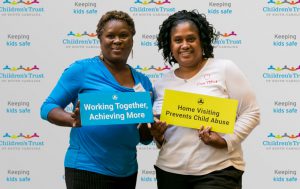With the 2018 Home Visiting Summit approaching, Aditi Srivastav Bussells discusses how home visiting programs can help prevent adverse childhood experiences. Bussells, who is working on her Ph.D. at the University of South Carolina’s Arnold School of Public Health as a Doris Duke Foundation Fellow, is the research and community impact manager at Children’s Trust.
We know that what happens in childhood affects a person into adulthood, and science shows that adverse childhood experiences (ACEs) can have a long-term negative impact on health and social outcomes. But we also know that the effects of ACEs are preventable. When we help children and families overcome the consequences of traumatic experiences, we give them a pathway to avoid future trauma.

Attendees at the 2016 Home Visiting Summit learned about the importance of preventing childhood adversity.
Research shows that it just takes one positive relationship with an adult for children to bounce back from any adversity they have experienced. We also know that families with trusted friends and connections are stronger and better able to provide that nurturing environment every child needs. This is why we believe home visiting is so important.
By connecting one-on-one with parents and caregivers, home visiting professionals provide that support. They work with parents to improve their parenting skills, build stronger parent-child relationships and increase family self-sufficiency.
It’s no surprise that evidence from home visiting programs show major improvement in many child and family health outcomes. For example, 81 percent of visitation programs across the country yielded improvements in maternal and children’s health, including a 48 percent reduction in child abuse and neglect.
To ensure that our programs continue to be successful, we support home visitors through training and professional development, especially around topic areas that can be difficult to discuss with families, such as trauma. Because ACEs are common and often intergenerational, it is especially important to have resources that take a dual-generation approach, helping parents deal with their own traumas in order to “break the cycle.”
Recognizing this need, home visiting experts have begun to develop tools and resources on ACEs. The Pew Charitable Trusts conducted a study on the best way to talk about home visiting programs with eligible families. THRIVE Washington created a comprehensive toolkit for home visitors to talk about the different components of ACEs, including the neuroscience and epigenetics.
Recently, the Connections Matter initiative created an easy-to-understand booklet to help home visitors talk about ACEs and resilience with families. This booklet highlights the importance of building strong brains in children by focusing on the importance of positive relationships between a child and parent/caregiver. This resource provides actionable steps that can be used to build a resilient family. It is a great tool to take on home visits or use for trainings at home visiting sites.
Home visiting works. At Children’s Trust of South Carolina, we recognize and celebrate the vital role that home visitors play in preventing ACEs and helping families thrive.
Learn more about the 2018 Home Visiting Summit Sept. 17-18 at the USC Alumni Center.






